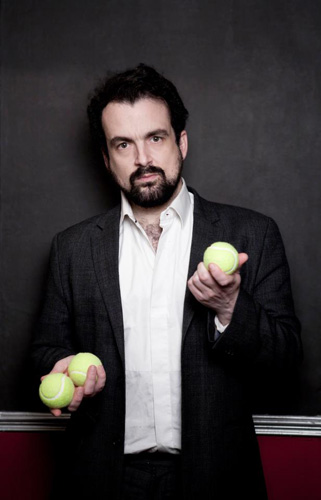
After finding great international success with his debut feature film Timecrimes in 2007, writer/director Nacho Vigalondo performed a bit of a 180 for his sophomore effort.
Coming to the Toronto International Film Festival last year with a romantic comedy set to the backdrop of an alien invasion, his Extraterrestrial showed he would not be pigeonholed to dark thrillers with twists a la M. Night Shyamalan. It’s a move that showed his versatility and creative story-telling approach—two things that must have appealed to Hollywood with him now attached to direct an adaptation of Mark Millar‘s Supercrooks.
I had the pleasure of speaking with the auteur recently about his new film and his love of time as both motif and plot construction. A good-humored, self-deprecating soul, Nacho Vigalondo’s name deserves to be remembered from this point forward if it hasn’t already. His cinematic future is looking very bright.
Nacho Vigalondo: It’s something that I am conscious about when I’m making a movie, but not in order to amuse audiences. It’s to amuse myself. I want to get excited about the project I’m writing from the very beginning. And if that implies I’m playing with the shape of the film from the very beginning, I’m okay with that.
I love to play with movies, but I think that that is not enough. A movie survives because there is something meaningful inside. And that’s something audiences have to find. I think that it’s okay to play with rules and the aspects of your films, but there has to be something else to make sense of everything.
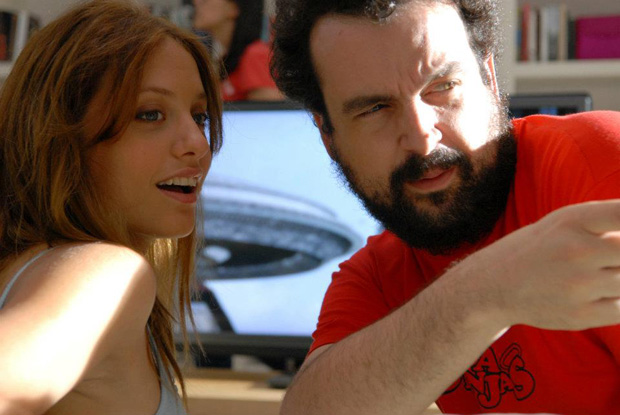
Your lead characters are generally in the dark as to what’s happening to them. Do you find that helps viewers relate to the mystery and enter the story to journey through it?
More than a way to create a sense of mystery in my films, I love to stick with a lack of—
I want to [make] the audience as limited as the characters because I find it—there’s a human relevance to that. For me it’s very important that the characters [in Extraterrestrial] don’t get to see the whole UFO until the very end.
This is the thing that I am always playing with—the fact that I am not working with big budgets. I want to—instead of become a victim to that—I want to find new qualities to the fact that I can’t show a big alien invasion in a traditional way.
So for me it’s really important—knowing that the characters are not going to be able to fly up to get inside the UFO, I want to play with the fact that they are not even able to watch it at home. That’s the reason the main character has to picture the rest of the UFO on the cardboard—as you can see in the film. That sequence for me is kind of the manifesto of what I’m doing in this film.
I love to—for me that’s the human nature. It’s what we are: people who are not able to perceive the whole. We are only able to perceive a portion of it. I think that’s really interesting and I want the characters to be human in that way. They’re not able to see the whole thing.
And that doesn’t necessarily have to do with mystery.
And speaking to that humanity, your characters also seem to always have ulterior motives—they’ll do whatever is necessary without initially caring about the consequences. Do you see humanity as needing to overcome that selfishness? Are we victims to self-preservation?
Yeah. Yeah, that’s another human quality—the fact that we are not aware of consequences all the time. This is something that I learned from [Alfred] Hitchcock films. And I’m not [just] a fan of Hitchcock. Because I think that I am something bigger than a fan.
I love characters to be like Hitchcock characters—to be guilty. And I love guilt as a feeling. And I love when I put the characters against [their] guilty nature. But it’s not necessarily a way to test them or punish them. It’s something I love to work with in a deeper way instead of just punishing bad people.
I’m trying to say this in a better way.
Instead of punishing characters, I prefer to give these characters a chance to face their own guilt—to examine themselves. In fact, you can see that in two of my feature films, the main character is also the bad guy. You can agree with me knowing that the main character in Extraterrestrial could be described as a villain in another film.
Because plot points like the spaceship are kind of secondary, your characters need to have an authenticity to deal with these circumstances. How hard was it to find actors—especially Michelle Jenner and Julián Villagrán who ‘write’ the movie through your dialogue as it goes along?
Yes, I have to say that I don’t like to do casting because that is [a] cruel [system]. I like to be able to know who are going to be my actors from the very beginning and write for them. This is something that you can do only if you are doing small indie films.
So, in the case of the main couple [Jenner and Villagrán], I wrote these dialogues knowing they would be the guys speaking them in the movie. I wanted to adapt to them as much as they adapted to the movie.
It’s complicated because it’s not about them carrying the movie on their shoulders because you explained it pretty well—they are making the whole plot of the movie. They are talking about—they are building the plot of a movie that is more expensive than mine. [laughs] That is funny.
Not only that, they are also—[there needs to be great] chemistry between all three characters. Something that I was really aware of was building a comedy in which chemistry was part of the result—the chemistry between characters. I wanted to use actors that came from pure acting in a traditional way.
The main couple come from drama, they come from theater, and the other three characters come from comedy. I wanted to give all the characters the chance to be comical and [dramatic] in different ways. I wanted to make those kinds of movies [where] you have the romantic element on one side and the funny characters come from the other side—they are separated. I wanted all of them to work in a homogenous situation in which all of them are funny and [dramatic].
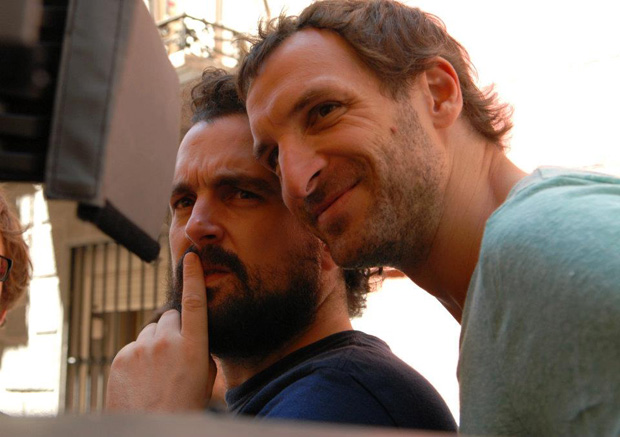
I had read that you originally conceived of a scene where the two main characters meet and you removed it in service of the story. How hard was it to objectively look at the whole and sacrifice what you thought was a funny scene?
The funny thing is that I wrote that scene as a short film in the very beginning and I didn’t even come to shoot it. So that sequence won’t be on the DVD because it doesn’t exist. But I don’t know if that is something I should feel proud about, or what, but in my two films there are no deleted sequences at all. So in this moment I’m not filling DVDs [laughs].
The reason I pulled the sequence out of the movie was because it felt redundant with everything we told—it was all the things we’re telling after, between them. In this movie, when you explain in a clear way what happens the night before, somehow you’re losing this little layer of humility that you get at the beginning of the film. So, I love the fact that they were so drunk they don’t remember. For me it’s for the audience to not know more than them about what happened.
This is something I’m doing all the time in the movie—sticking to the lack of perception of the characters. And for me, not letting the audience know what happened the night before is fair in that sense because the characters don’t know.
The disorientation is similar to the way people say aliens abduct them too—how they lose time. So it gets you thinking that maybe they were taken.
Yes, I love to—I think it’s fair to give the audience a chance to imagine something different from what you wrote. And again, something more expensive than you shoot.
Do you like working in the atmosphere of low budgets? You can have the control and freedom to fulfill your vision?
I’m open to big budgets [laughs] at this point in my career. But in low budgets—I love to work in movies that feel contained at some point. I like to work with the continuity of time and space.
For example, one of the things I’ve written is a mystery—a room mystery. You know these kinds of videogames in which you have to escape from a single room with some little objects? I’d love to apply that to a film because I love the energy that gets delivered when you are with such devices like real time or single locations.
It’s something that’s maybe an aesthetic thing instead of a meaningful thing. It’s about pure cinematic energy instead of something I can explain.
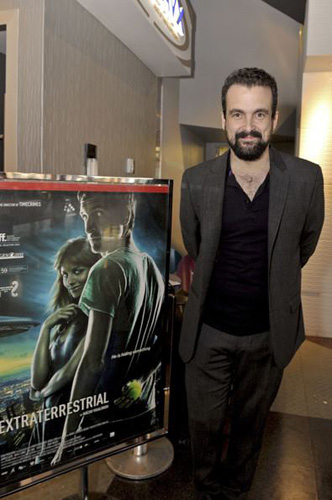
Now you said you wrote the roles for the actors. Had you worked with or directed them before in anything? Or just saw them perform and realized you wanted to work with them?
The actors I have worked with before: Carlos the husband who is played by Raúl Cimas and Ángel the neighbor who is played by Carlos Areces—they are both part of a group of Spanish comedians. They have a TV show. And in that show I worked before, writing some sketches. So I had already worked with these people and really love to work with them. And I have even some short films in which they appear.
Was it different—the two films I had seen of yours had you playing a pretty big acting role in them as well. Did you always want to step back and not act in Extraterrestrial?
I think that no one misses me [laughs] in this film.
But you know what happens when you’re a director? I come from acting. I spent the whole 90s acting in commercials and short films or whatever—my own or from other people—so I considered myself an actor.
But sometimes it is uncomfortable when you are a director and you appear in your own films. In the case of Timecrimes, while international audiences were okay, in Spain pretty much everyone hated me for being in the film.
Really?
Yeah. Totally. In fact, you could read one of the reviews in the important newspapers. One of those reviews was basically about my performance in the film, for example.
So I got the message. And on the other hand, I never intended to appear in all my films. I think there is no space for me in this movie. I wanted to enjoy directing these actors.
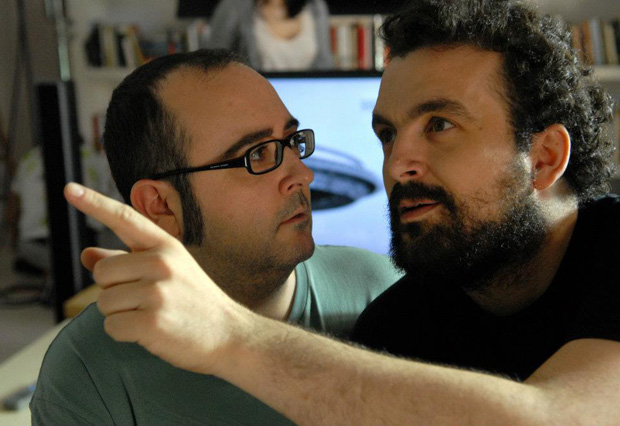
You’ve jumped genres from thriller to romantic comedy, but you’ve still kept that issue of time. You have some beautiful sequences in Timecrimes where you go back and show how things really happened and in Extraterrestrial where characters listening to the lie think, “Oh, wait. Maybe that is how it happened.” Do you see yourself continuing to play with time in the future?
Yes, I love to deal with time all the time [laughs]. It’s something that I find hard to explain, but I always like working with time. And it’s not always about time travel but I also like to work with real time, for example. I like to play with ellipses.
I have for example this little game in the film. When [Julia] wakes up at the end of the film, sleeping on the sofa. And she wakes up and it feels as though [Julio] is next to her recording himself on the camera. But again, in doing this little trick—he’s not there exactly. I love to play with time on that level and not only in movies that have to deal with time in a big way, but also in the details in terms of continuity.
I don’t know why this happens—maybe because in real life I have issues with space. I get lost all the time—even in my own city of Madrid. I have this weakness for space and get lost all the time. My sense of orientation is a joke. So maybe that is the reason I love to deal with time movies because I feel closer to control outside of reality. I don’t know.
And you like taking that adventure when you get lost? Or do you wish it wasn’t that way?
I love the feeling of getting lost in a city, but maybe that is because I don’t have a chance [to prevent it]. [laughs]
Well thank you for talking with us and I just want to congratulate you on a great movie—I love both your films.
Can I tell you—I was really terrified about the international audiences because they seem to like Timecrimes so much and now I’m coming back with something that is not only different but pretty much the opposite. So I was frightened [for] the reactions, but at this moment [doing international press interviews] I’m kind of living this love story with reviewers and everything. So thank you.

Extraterrestrial is in limited release and on VOD starting June 15th.

